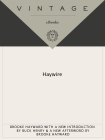Haywire by Brooke Hayward (book club books .txt) 📗

- Author: Brooke Hayward
Book online «Haywire by Brooke Hayward (book club books .txt) 📗». Author Brooke Hayward
Cornelius Sullavan was spry and gay, and his wife, Garland, was plump and charming. Both were shorter than average; that seemed, at the time of their visit, to be the only respect in which Mother (who was five feet two) took after either of them.
Six months later, when Bridget and I came across photographs of Garland, aged twenty, taken in the mid-eighteen-nineties, we could see a passing facial resemblance to Mother, although we couldn’t tell about much else, since Garland’s loose hair—actually a full two thirds of her height—fell around her like a dark mantle, concealing most of her wedding dress, which swept, in turn, to the floor. She was so tiny that the actual dress, with its lovely satin panels interspersed with handmade lace and its long narrow sleeves (which she handed down to Mother, who kept it carefully guarded in a carton of tissue paper in the hope that one day Bridget or I would wear it), had an eighteen-inch waist. Consequently it made only one quasi-successful appearance on either of us; that was when Bridget was fourteen and at her skinniest. For the sake of a single fast Polaroid shot, Mother and I spent an hour cramming her into a waist cincher and forcibly buttoning hundreds of tiny satin buttons—mercifully leaving an inch here or there undone so that she could breathe—before she screamed that she would explode all over the house like goose liver if we didn’t loosen her bonds instantly.
Garland’s first marriage left her a widow after three months, since her young husband, Lewis Gregory Winston, contracted typhoid and never lived to see their daughter, Lewise. Seven years later, Garland married Cornelius Hancock Sullavan and moved to Norfolk, Virginia. In 1909, Mother, christened Margaret Brooke (and known to her family and friends as “Peggy,” a nickname she loathed and changed to “Maggie” when she was twenty-one), was born.
Although Cornelius’s produce business suffered from the slow postwar recovery in the South, Mother remembered a pleasant, gracious style of living: a cheerful house on Westover Street facing the park; wide porches, where, on hot summer afternoons, she entertained swarms of ardent beaus, to the vast irritation of her younger brother, Sonny (who would hover just inside the screen door and loudly stir the ice cubes in his iced-tea glass to drive them away); Sunday School at St. Andrews Church, where Cornelius was a vestryman; sewing and dancing classes; exquisite dresses stitched by the family seamstress; wonderful food; gay parties to celebrate her father’s yearly hunting expeditions, from which he returned laden down with partridges and pheasant. Cornelius had a reputation for being one of the best shots in Virginia; from him Mother inherited a passion for hunting and her treasured Parker 28-gauge shotgun—its handle marvelously engraved with game birds and animals.
Mother told us that she had become an actress by accident. Her real ambition, when she was young, was to be a dancer. From those early photographs at camp and school, it was clear she would have made a good one, whether affecting the limpid, stylized poses and Greek tunics of Isadora Duncan, or perching merrily on a tree stump in the jerkin and feathered cock hat of Peter Pan. Of all the accomplishments in her life, I only heard her boast of two: her award, one summer, as best all-round athlete at Camp Aloha (a dog-eared, gray felt letter “A,” carefully affixed to the scrapbook page with ancient Scotch tape), and her senior year at Chatham Episcopal Institute, in which she was elected president of the Student Council, voted the “most talented” girl in her class, and chosen to deliver the salutatory oration at its Commencement in 1927 (“O! so light a foot will ne’er wear out the everlasting flint”-M.B.S.).
After Chatham, she spent a year at Sullins College, Virginia, where she appeared to have excelled at every activity she undertook (not the least of which was flirting outrageously, to judge from the trail of dance cards and heartbroken letters in Volume I), and was named “most popular” girl in her class.
At the end of the year, she returned to Norfolk for her summer vacation. Suddenly life there seemed unutterably boring. Worse, the future, as projected by her traditional Southern upbringing and her parents’ expectations, could only become more respectable and stultifying. She was young; she had determination, curiosity, ambition, and talent without knowing exactly how much, in what way, or how to measure any of those qualities against what standards. Her feet itched. Within a few months she left home and went north to stay in Boston with her half-sister, Weedie. From the Boston Sunday Post, May, 1929, was pasted a newspaper clipping of Mother in slacks and sneakers ebulliently executing a high kick: “High-steppers,” read the heavily penciled caption under it, “of the coming Harvard Dramatic Club show, Close Up, to be given this week.… Peggy Sullavan of Norfolk, Virginia …” And there, in that show, her future began.
Josh Logan, later appointed one of our four godfathers, remembers:
“I must have been twenty and she must have been eighteen. I was a student at Princeton; I went up to Harvard one





Comments (0)